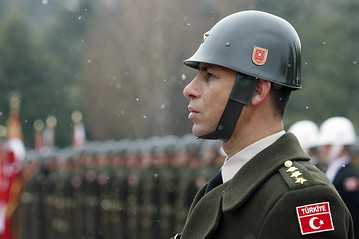By Joe Parkinson
Turkey’s controversial monetary policy has caught the attention of many in the market as a creative, if risky, way to combat the economic crisis.
Now Ankara is floating another potentially polarizing idea to help boost the coffers: allowing conscripted recruits to buy their way out of military service, en masse.

Associated Press
A Turkish army officer in Ankara.
Turkish media reported this week that the long-awaited proposal, which is yet to be finalized, would allow draftees to pay a lump sum to gain exemption from military service, which is compulsory for all healthy Turkish male citizens under 35 years old. The legislation would principally target draftees with families who are working in senior professional positions, or those who have spent significant time abroad, the media reports said.
Finance Minister Simsek told reporters on Tuesday in Istanbul that an announcement on military service would be forthcoming, while Justice Minister Sadullah Ergin said on Monday that Prime Minister Recep Tayyip Erdogan would announce details of the plan within two weeks.
Estimates for how much exemption would cost, and how much it would raise, vary. Today’s Zaman, a government-friendly daily, reported on Monday that Ankara would charge $15,000 to sidestep military service. Government sources expected 100,000 male citizens to take advantage, raising some $1.5 billion, the newspaper said.
The news comes after Mr. Erdogan said last week that his government was considering the introduction of paid military service as “a priority matter” and hoped to legislate before the end of the year.
Political analysts said the measures would likely raise a significantly lower amount than government forecasts and warned it could seriously undermine morale.
“The measure should generate around 500 million liras. But the main problem here is that it would be highly damaging to morale. It clearly discriminates against the poor. This will simply make more people go AWOL,” said Atilla Yesilada, analyst at Global Source Partners, an Istanbul-based research consultancy.
“The government should completely professionalize the army – i don’t know what’s holding them back. They had several proposals like crack police force, special units serving under ministry of interior,” Mr. Yesilada said.
Government ministers have stressed that conscription reforms would be motivated by “social realities” rather than financial pressure. Turkey’s economy outpaced China’s in the first half of the year to post the fastest growth of any Group of 20 economy. That growth has also brought some problems, with booming domestic demand propelling a current-account deficit forecast to top 9% of gross domestic product this year, leaving the economy exposed to external shocks.
Data on Tuesday showed the current-account deficit widened to $6.8 billion in September, broadly in line with expectations, but significantly above the $4 billion gap recorded in August.
Defence minister Ismet Yilmaz told state-run Anatolian News Agency last week that the government is seeking to rationalize the system, effectively charging for an amnesty from military service. “There are people who are over 35, 40 and even 45. Are we going to tear them apart from their families, children and jobs? Some of them could be abroad anyway. So, social realities are imposing such an arrangement,” he said.
Turks who attempt to avoid military service can be forced to serve.
Some analysts said the moves were driven more by ideology than economic considerations; specifically the ruling AK-party’s long-held goal of creating a professionalized military. Despite Turkey’s bloated budget deficit, its primary fiscal balances are in relatively rude health, posting a 30 billion lira surplus from January to October, according to the central bank.
Mr. Erdogan’s ruling AK party, which has won three successive elections after sweeping to power on a landslide in 2002, has consistently chipped away at the military’s one-time dominance over popularly elected governments. In August the military’s top commanders resigned en masse in a dispute over the status of jailed officers. For decades it worked the other way round; governments resigned when the military was unhappy.
Payouts to avoid service are not new for Turks — especially those who lived and worked abroad for a significant period – but the government’s proposals would increase Turkey-based draftees’ ability to avoid service.
The last time Turkey introduced a paid military-service law was after two devastating earthquakes that ravaged the country’s northwest in August and November 1999. It exempted conscripts from military service in return for a payment and a basic training of four weeks.
via Turkey Mulls Price of Military Service – Emerging Europe Real Time – WSJ.